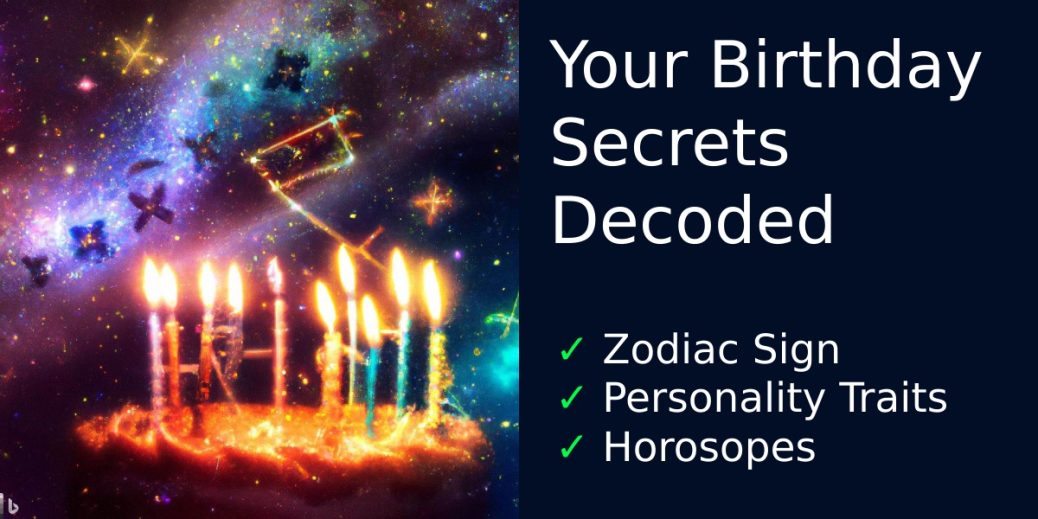Birthday Analysis - Enter Your Birth Date
Born in April 1954 - Zodiac Signs, Personality and Horoscopes

Please select your birth date for birthday analysis.
| S | M | T | W | T | F | S |
|---|---|---|---|---|---|---|
| 1 | 2 | 3 | ||||
| 4 | 5 | 6 | 7 | 8 | 9 | 10 |
| 11 | 12 | 13 | 14 | 15 | 16 | 17 |
| 18 | 19 | 20 | 21 | 22 | 23 | 24 |
| 25 | 26 | 27 | 28 | 29 | 30 | |
April 1954 Tropical Ephemeris
Note: A person's zodiac sign typically refers to their Sun sign, Moon position is location and time sensitive.| Planet | Date Range | Zodiac Sign |
|---|---|---|
| Sun | April 1, 1954 to April 20, 1954 | Aries |
| Sun | April 21, 1954 to April 30, 1954 | Taurus |
| Moon | April 1, 1954 to April 2, 1954 | Pisces |
| Moon | April 3, 1954 to April 4, 1954 | Aries |
| Moon | April 5, 1954 to April 6, 1954 | Taurus |
| Moon | April 7, 1954 to April 8, 1954 | Gemini |
| Moon | April 9, 1954 to April 11, 1954 | Cancer |
| Moon | April 12, 1954 to April 13, 1954 | Leo |
| Moon | April 14, 1954 to April 15, 1954 | Virgo |
| Moon | April 16, 1954 to April 18, 1954 | Libra |
| Moon | April 19, 1954 to April 20, 1954 | Scorpio |
| Moon | April 21, 1954 to April 23, 1954 | Sagittarius |
| Moon | April 24, 1954 to April 25, 1954 | Capricorn |
| Moon | April 26, 1954 to April 28, 1954 | Aquarius |
| Moon | April 29, 1954 to April 30, 1954 | Pisces |
| Mercury | April 1, 1954 to April 13, 1954 | Pisces |
| Mercury | April 14, 1954 to April 30, 1954 | Aries |
| Venus | April 1, 1954 to April 4, 1954 | Aries |
| Venus | April 5, 1954 to April 28, 1954 | Taurus |
| Venus | April 29, 1954 to April 30, 1954 | Gemini |
| Mars | April 1, 1954 to April 12, 1954 | Sagittarius |
| Mars | April 13, 1954 to April 30, 1954 | Capricorn |
| Jupiter | April 1, 1954 to April 30, 1954 | Gemini |
| Saturn | April 1, 1954 to April 30, 1954 | Scorpio |
| Uranus | April 1, 1954 to April 30, 1954 | Cancer |
| Neptune | April 1, 1954 to April 30, 1954 | Libra |
| Pluto | April 1, 1954 to April 30, 1954 | Leo |
| North Node (Rahu) | April 1, 1954 to April 30, 1954 | Capricorn |
| South Node (Ketu) | April 1, 1954 to April 30, 1954 | Cancer |
Chinese Zodiac Sign
Horse (马)
Age
71 years and 9 months old
If you were born on 1st April, 1954, you are 71 years old as on January 1, 2026.
Your next birthday is 2 months away.
What happened in April 1954
- April 1, 1954: U.S. Congress and President Dwight D. Eisenhower authorize the establishment of United States Air Force Academy in Colorado, promoting military education and airpower development.
- April 3, 1954: Petrov Affair: Soviet diplomat Vladimir Petrov defects to Australia, providing valuable intelligence and insights into Soviet operations, leading to increased awareness of espionage activities during the Cold War.
- April 4, 1954: Legendary conductor Arturo Toscanini's retirement from public performances due to memory lapse during a concert, marking the end of an illustrious career and leaving a lasting legacy in the world of classical music.
- April 7, 1954: Dwight D. Eisenhower's "domino theory" speech highlights the potential consequences of communism's spread in Southeast Asia, influencing U.S. foreign policy and Cold War strategies.
- April 8, 1954: Tragic mid-air collision between a Royal Canadian Air Force Harvard and a Trans-Canada Air Lines North Star over Moose Jaw, Saskatchewan, resulting in the loss of 37 lives and raising concerns about aviation safety.
- April 11, 1954: April 11th, 1954, is considered the most uneventful day in the 20th century, devoid of significant news, births, or deaths, providing a unique perspective on historical occurrences.
- April 12, 1954: Bill Haley & His Comets record "Rock Around the Clock", a pivotal moment in rock and roll history, contributing to the genre's popularity and helping to define the era's cultural landscape.
- April 14, 1954: Aneurin Bevan's resignation from the British Labour Party's Shadow Cabinet due to disagreements over West Germany's rearmament, highlighting internal party divisions and political complexities during the Cold War.
- April 16, 1954: Vice President Richard Nixon's statement about potentially deploying U.S. troops in Indochina without Allied support, reflecting the escalating tensions and U.S. involvement in the region.
- April 22, 1954: The 1951 United Nations Convention Relating to the Status of Refugees comes into effect, establishing a legal framework for refugee protection and asylum rights, addressing the plight of displaced individuals worldwide.
- April 26, 1954: International conference on Korea and Indo-China convenes in Geneva, aiming to address the ongoing conflicts and seek diplomatic solutions, highlighting the international efforts to resolve regional tensions.
- April 28, 1954: U.S. Secretary of State John Foster Dulles accuses Communist China of sending combat troops to Indo-China, escalating tensions and shaping Cold War dynamics in Southeast Asia.